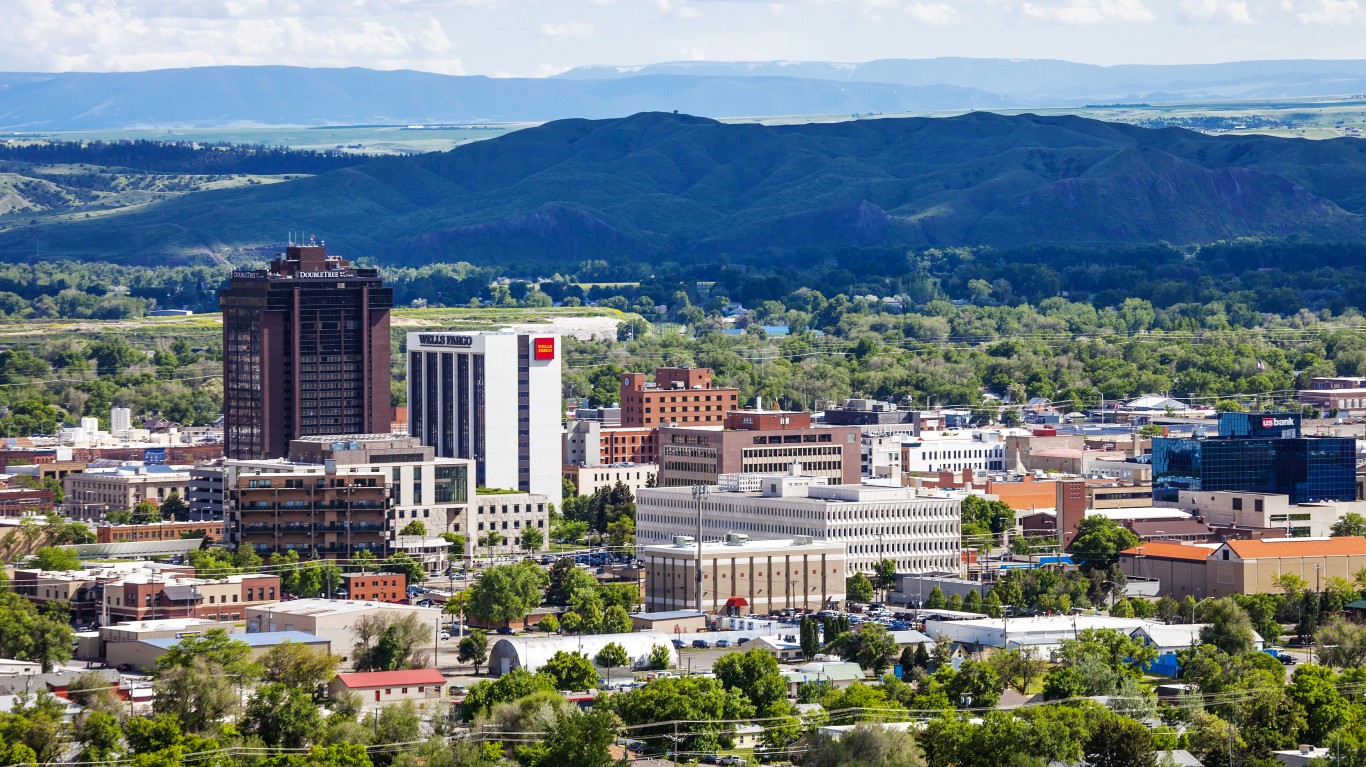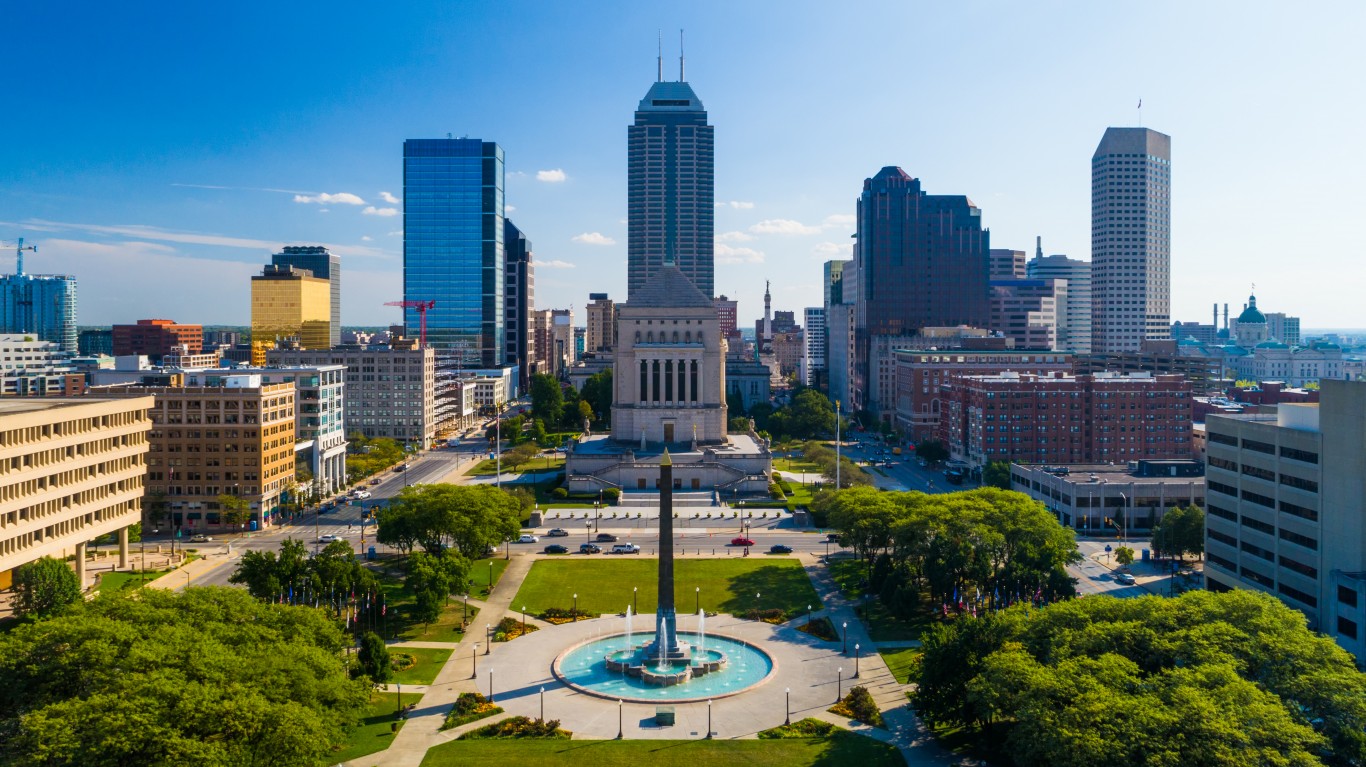Special Report
The Well-Being of Every State From Best to Worst, According to New Study

Published:
Last Updated:

Massachusetts was the state with best overall well-being in the nation in 2020, according to a new report released Tuesday, May 25, by digital health company Sharecare and the Boston University School of Public Health.
The report, based on more than 450,000 surveys across the U.S. last year, evaluates various dimensions of well-being. Well-being has emerged as an important concept in public policy in recent years because it can show how people perceive their own lives — a measurement that is not always captured by the many indicators of living conditions. (Here is the worst city to live in every state.)
We used external data to find commonalities between states with the best, middle, and low overall well-being. The states with the highest well-being scores tend to have higher median incomes, on the whole better access to healthy food, and better health outcomes such as lower adult obesity rates. The opposite tends to be true for states on the lower end of Sharecare’s ranking.
The report found that the top 10 states saw more than 20% lower COVID-19 incidence rates on average and upwards of 50% lower coronavirus-related death rates in comparison to states in the bottom 10. There are plenty of exceptions across all states. We included the total number of COVID-19 deaths in each state per 100,000 state residents as of May 24. (Here is a list of the worst pandemics in history.)
The states in our slideshow are ordered from highest to lowest overall well-being score.
To identify the states with the highest, lowest, and average overall well-being, 24/7 Tempo reviewed the overall well-being score from digital health company Sharecare’s Community Well-Being Index.
We included external data on median household income in each state from the U.S. Census Bureau’s 2019 American Community Survey, the percentage of each state’s population who are low-income and do not live close to a grocery store from County Health Rankings & Roadmaps, a program of the University of Wisconsin Population Health Institute, and each state’s adult obesity rate based on the percentage of the adult population (age 20 and older) that report a body mass index (BMI) greater than or equal to 30 kg/m2, also obtained from CHR.

1. Massachusetts
> Overall well-being score: 71.06
> Median household income: $85,843 — 2nd highest
> Pop that is low income and does not live close to a grocery store: 4.1% — 7th lowest
> Adult obesity rate: 24.7 — 4th lowest
> COVID-19 deaths per 100,000 as of May 25: 257.80 — 3rd highest (total: 17,794)
[in-text-ad]

2. Hawaii
> Overall well-being score: 70.63
> Median household income: $83,102 — 4th highest
> Pop that is low income and does not live close to a grocery store: 6.9% — 20th highest
> Adult obesity rate: 23.7 — 3rd lowest
> COVID-19 deaths per 100,000 as of May 25: 34.42 — the lowest (total: 489)

3. New Jersey
> Overall well-being score: 69.98
> Median household income: $85,751 — 3rd highest
> Pop that is low income and does not live close to a grocery store: 3.6% — 5th lowest
> Adult obesity rate: 26.4 — 11th lowest
> COVID-19 deaths per 100,000 as of May 25: 292.19 — the highest (total: 26,030)

4. Maryland
> Overall well-being score: 69.92
> Median household income: $86,738 — the highest
> Pop that is low income and does not live close to a grocery store: 3.4% — 4th lowest
> Adult obesity rate: 31.0 — 23rd highest
> COVID-19 deaths per 100,000 as of May 25: 148.26 — 18th lowest (total: 8,959)
[in-text-ad-2]

5. New York
> Overall well-being score: 69.00
> Median household income: $72,108 — 14th highest
> Pop that is low income and does not live close to a grocery store: 2.3% — the lowest
> Adult obesity rate: 25.5 — 5th lowest
> COVID-19 deaths per 100,000 as of May 25: 269.94 — 2nd highest (total: 52,752)

6. California
> Overall well-being score: 66.85
> Median household income: $80,440 — 5th highest
> Pop that is low income and does not live close to a grocery store: 3.3% — 2nd lowest
> Adult obesity rate: 23.6 — 2nd lowest
> COVID-19 deaths per 100,000 as of May 25: 155.61 — 22nd lowest (total: 61,555)
[in-text-ad]

7. Connecticut
> Overall well-being score: 66.42
> Median household income: $78,833 — 6th highest
> Pop that is low income and does not live close to a grocery store: 4.3% — 9th lowest
> Adult obesity rate: 25.8 — 8th lowest
> COVID-19 deaths per 100,000 as of May 25: 229.63 — 7th highest (total: 8,204)

8. Washington
> Overall well-being score: 65.08
> Median household income: $78,687 — 7th highest
> Pop that is low income and does not live close to a grocery store: 5.5% — 19th lowest
> Adult obesity rate: 27.8 — 15th lowest
> COVID-19 deaths per 100,000 as of May 25: 75.28 — 7th lowest (total: 5,673)

9. Colorado
> Overall well-being score: 64.95
> Median household income: $77,127 — 9th highest
> Pop that is low income and does not live close to a grocery store: 5.5% — 18th lowest
> Adult obesity rate: 21.8 — the lowest
> COVID-19 deaths per 100,000 as of May 25: 113.63 — 9th lowest (total: 6,472)
[in-text-ad-2]

10. Utah
> Overall well-being score: 64.59
> Median household income: $75,780 — 11th highest
> Pop that is low income and does not live close to a grocery store: 5.8% — 24th lowest
> Adult obesity rate: 25.9 — 9th lowest
> COVID-19 deaths per 100,000 as of May 25: 71.97 — 6th lowest (total: 2,275)

11. Virginia
> Overall well-being score: 64.31
> Median household income: $76,456 — 10th highest
> Pop that is low income and does not live close to a grocery store: 4.3% — 8th lowest
> Adult obesity rate: 29.8 — 23rd lowest
> COVID-19 deaths per 100,000 as of May 25: 129.94 — 14th lowest (total: 11,068)
[in-text-ad]

12. Rhode Island
> Overall well-being score: 63.53
> Median household income: $71,169 — 15th highest
> Pop that is low income and does not live close to a grocery store: 4.7% — 13th lowest
> Adult obesity rate: 28.1 — 18th lowest
> COVID-19 deaths per 100,000 as of May 25: 255.65 — 4th highest (total: 2,703)

13. Illinois
> Overall well-being score: 63.43
> Median household income: $69,187 — 17th highest
> Pop that is low income and does not live close to a grocery store: 4.5% — 10th lowest
> Adult obesity rate: 29.7 — 22nd lowest
> COVID-19 deaths per 100,000 as of May 25: 195.15 — 17th highest (total: 24,864)

14. Oregon
> Overall well-being score: 62.54
> Median household income: $67,058 — 18th highest
> Pop that is low income and does not live close to a grocery store: 5.4% — 17th lowest
> Adult obesity rate: 28.8 — 19th lowest
> COVID-19 deaths per 100,000 as of May 25: 62.07 — 5th lowest (total: 2,601)
[in-text-ad-2]

15. Minnesota
> Overall well-being score: 62.20
> Median household income: $74,593 — 13th highest
> Pop that is low income and does not live close to a grocery store: 5.6% — 22nd lowest
> Adult obesity rate: 27.9 — 16th lowest
> COVID-19 deaths per 100,000 as of May 25: 132.20 — 15th lowest (total: 7,418)

16. New Hampshire
> Overall well-being score: 60.65
> Median household income: $77,933 — 8th highest
> Pop that is low income and does not live close to a grocery store: 5.0% — 15th lowest
> Adult obesity rate: 27.9 — 17th lowest
> COVID-19 deaths per 100,000 as of May 25: 98.79 — 8th lowest (total: 1,340)
[in-text-ad]

17. Pennsylvania
> Overall well-being score: 60.52
> Median household income: $63,463 — 23rd highest
> Pop that is low income and does not live close to a grocery store: 4.6% — 11th lowest
> Adult obesity rate: 30.3 — 25th highest
> COVID-19 deaths per 100,000 as of May 25: 210.24 — 11th highest (total: 26,925)

18. Nebraska
> Overall well-being score: 60.24
> Median household income: $63,229 — 25th highest
> Pop that is low income and does not live close to a grocery store: 5.6% — 23rd lowest
> Adult obesity rate: 32.2 — 16th highest
> COVID-19 deaths per 100,000 as of May 25: 116.31 — 10th lowest (total: 2,244)

19. Delaware
> Overall well-being score: 60.19
> Median household income: $70,176 — 16th highest
> Pop that is low income and does not live close to a grocery store: 4.7% — 12th lowest
> Adult obesity rate: 30.9 — 24th highest
> COVID-19 deaths per 100,000 as of May 25: 170.81 — 25th lowest (total: 1,652)
[in-text-ad-2]

20. North Dakota
> Overall well-being score: 59.52
> Median household income: $64,577 — 20th highest
> Pop that is low income and does not live close to a grocery store: 7.0% — 19th highest
> Adult obesity rate: 32.7 — 13th highest
> COVID-19 deaths per 100,000 as of May 25: 198.27 — 14th highest (total: 1,507)

21. Nevada
> Overall well-being score: 59.03
> Median household income: $63,276 — 24th highest
> Pop that is low income and does not live close to a grocery store: 5.4% — 16th lowest
> Adult obesity rate: 25.7 — 6th lowest
> COVID-19 deaths per 100,000 as of May 25: 182.74 — 21st highest (total: 5,545)
[in-text-ad]

22. Vermont
> Overall well-being score: 58.94
> Median household income: $63,001 — 25th lowest
> Pop that is low income and does not live close to a grocery store: 3.3% — 3rd lowest
> Adult obesity rate: 26.3 — 10th lowest
> COVID-19 deaths per 100,000 as of May 25: 40.72 — 2nd lowest (total: 255)

23. Alaska
> Overall well-being score: 58.78
> Median household income: $75,463 — 12th highest
> Pop that is low income and does not live close to a grocery store: 9.2% — 5th highest
> Adult obesity rate: 32.5 — 14th highest
> COVID-19 deaths per 100,000 as of May 25: 49.09 — 3rd lowest (total: 362)

24. Florida
> Overall well-being score: 58.54
> Median household income: $59,227 — 17th lowest
> Pop that is low income and does not live close to a grocery store: 7.2% — 17th highest
> Adult obesity rate: 26.6 — 12th lowest
> COVID-19 deaths per 100,000 as of May 25: 170.29 — 24th lowest (total: 36,271)
[in-text-ad-2]

25. Wisconsin
> Overall well-being score: 58.42
> Median household income: $64,168 — 21st highest
> Pop that is low income and does not live close to a grocery store: 4.8% — 14th lowest
> Adult obesity rate: 31.3 — 22nd highest
> COVID-19 deaths per 100,000 as of May 25: 133.00 — 16th lowest (total: 7,732)

26. Kansas
> Overall well-being score: 58.13
> Median household income: $62,087 — 24th lowest
> Pop that is low income and does not live close to a grocery store: 8.3% — 14th highest
> Adult obesity rate: 33.2 — 11th highest
> COVID-19 deaths per 100,000 as of May 25: 173.55 — 25th highest (total: 5,053)
[in-text-ad]

27. Arizona
> Overall well-being score: 57.71
> Median household income: $62,055 — 23rd lowest
> Pop that is low income and does not live close to a grocery store: 7.5% — 16th highest
> Adult obesity rate: 27.5 — 14th lowest
> COVID-19 deaths per 100,000 as of May 25: 243.97 — 5th highest (total: 17,497)

28. Wyoming
> Overall well-being score: 57.42
> Median household income: $65,003 — 19th highest
> Pop that is low income and does not live close to a grocery store: 8.7% — 9th highest
> Adult obesity rate: 28.9 — 20th lowest
> COVID-19 deaths per 100,000 as of May 25: 123.41 — 12th lowest (total: 713)

29. Maine
> Overall well-being score: 57.00
> Median household income: $58,924 — 16th lowest
> Pop that is low income and does not live close to a grocery store: 3.8% — 6th lowest
> Adult obesity rate: 29.9 — 24th lowest
> COVID-19 deaths per 100,000 as of May 25: 60.97 — 4th lowest (total: 816)
[in-text-ad-2]

30. South Dakota
> Overall well-being score: 56.90
> Median household income: $59,533 — 18th lowest
> Pop that is low income and does not live close to a grocery store: 10.5% — 3rd highest
> Adult obesity rate: 31.8 — 20th highest
> COVID-19 deaths per 100,000 as of May 25: 226.02 — 9th highest (total: 1,994)

31. Ohio
> Overall well-being score: 56.48
> Median household income: $58,642 — 15th lowest
> Pop that is low income and does not live close to a grocery store: 6.8% — 23rd highest
> Adult obesity rate: 32.3 — 15th highest
> COVID-19 deaths per 100,000 as of May 25: 167.91 — 23rd lowest (total: 19,628)
[in-text-ad]

32. Georgia
> Overall well-being score: 56.43
> Median household income: $61,980 — 22nd lowest
> Pop that is low income and does not live close to a grocery store: 9.0% — 7th highest
> Adult obesity rate: 32.0 — 19th highest
> COVID-19 deaths per 100,000 as of May 25: 195.53 — 16th highest (total: 20,569)

33. Montana
> Overall well-being score: 56.39
> Median household income: $57,153 — 11th lowest
> Pop that is low income and does not live close to a grocery store: 8.3% — 13th highest
> Adult obesity rate: 25.8 — 7th lowest
> COVID-19 deaths per 100,000 as of May 25: 150.80 — 20th lowest (total: 1,602)
34. Missouri
> Overall well-being score: 56.24
> Median household income: $57,409 — 13th lowest
> Pop that is low income and does not live close to a grocery store: 6.8% — 22nd highest
> Adult obesity rate: 32.2 — 17th highest
> COVID-19 deaths per 100,000 as of May 25: 146.84 — 17th lowest (total: 8,996)
[in-text-ad-2]

35. Texas
> Overall well-being score: 56.15
> Median household income: $64,034 — 22nd highest
> Pop that is low income and does not live close to a grocery store: 8.7% — 10th highest
> Adult obesity rate: 30.1 — 25th lowest
> COVID-19 deaths per 100,000 as of May 25: 174.20 — 24th highest (total: 49,999)

36. Iowa
> Overall well-being score: 56.07
> Median household income: $61,691 — 21st lowest
> Pop that is low income and does not live close to a grocery store: 5.6% — 20th lowest
> Adult obesity rate: 33.2 — 10th highest
> COVID-19 deaths per 100,000 as of May 25: 190.68 — 19th highest (total: 6,018)
[in-text-ad]

37. North Carolina
> Overall well-being score: 55.85
> Median household income: $57,341 — 12th lowest
> Pop that is low income and does not live close to a grocery store: 6.7% — 24th highest
> Adult obesity rate: 31.4 — 21st highest
> COVID-19 deaths per 100,000 as of May 25: 124.60 — 13th lowest (total: 12,938)

38. Michigan
> Overall well-being score: 55.50
> Median household income: $59,584 — 19th lowest
> Pop that is low income and does not live close to a grocery store: 6.3% — 25th lowest
> Adult obesity rate: 32.0 — 18th highest
> COVID-19 deaths per 100,000 as of May 25: 199.39 — 13th highest (total: 19,931)

39. Idaho
> Overall well-being score: 55.17
> Median household income: $60,999 — 20th lowest
> Pop that is low income and does not live close to a grocery store: 7.1% — 18th highest
> Adult obesity rate: 29.3 — 21st lowest
> COVID-19 deaths per 100,000 as of May 25: 118.23 — 11th lowest (total: 2,074)
[in-text-ad-2]

40. South Carolina
> Overall well-being score: 54.52
> Median household income: $56,227 — 10th lowest
> Pop that is low income and does not live close to a grocery store: 9.1% — 6th highest
> Adult obesity rate: 32.9 — 12th highest
> COVID-19 deaths per 100,000 as of May 25: 190.14 — 20th highest (total: 9,667)

41. Indiana
> Overall well-being score: 54.39
> Median household income: $57,603 — 14th lowest
> Pop that is low income and does not live close to a grocery store: 6.9% — 21st highest
> Adult obesity rate: 33.4 — 8th highest
> COVID-19 deaths per 100,000 as of May 25: 202.01 — 12th highest (total: 13,518)
[in-text-ad]

42. Tennessee
> Overall well-being score: 53.48
> Median household income: $56,071 — 9th lowest
> Pop that is low income and does not live close to a grocery store: 8.5% — 12th highest
> Adult obesity rate: 33.2 — 9th highest
> COVID-19 deaths per 100,000 as of May 25: 182.47 — 22nd highest (total: 12,353)

43. Louisiana
> Overall well-being score: 53.04
> Median household income: $51,073 — 4th lowest
> Pop that is low income and does not live close to a grocery store: 9.5% — 4th highest
> Adult obesity rate: 35.4 — 4th highest
> COVID-19 deaths per 100,000 as of May 25: 225.52 — 10th highest (total: 10,509)

44. Alabama
> Overall well-being score: 52.49
> Median household income: $51,734 — 5th lowest
> Pop that is low income and does not live close to a grocery store: 7.9% — 15th highest
> Adult obesity rate: 35.5 — 3rd highest
> COVID-19 deaths per 100,000 as of May 25: 226.56 — 8th highest (total: 11,074)
[in-text-ad-2]

45. Oklahoma
> Overall well-being score: 50.90
> Median household income: $54,449 — 8th lowest
> Pop that is low income and does not live close to a grocery store: 8.6% — 11th highest
> Adult obesity rate: 33.7 — 7th highest
> COVID-19 deaths per 100,000 as of May 25: 175.83 — 23rd highest (total: 6,933)

46. Kentucky
> Overall well-being score: 50.08
> Median household income: $52,295 — 7th lowest
> Pop that is low income and does not live close to a grocery store: 5.6% — 21st lowest
> Adult obesity rate: 33.8 — 6th highest
> COVID-19 deaths per 100,000 as of May 25: 149.45 — 19th lowest (total: 6,678)
[in-text-ad]

47. West Virginia
> Overall well-being score: 49.82
> Median household income: $48,850 — 2nd lowest
> Pop that is low income and does not live close to a grocery store: 6.6% — 25th highest
> Adult obesity rate: 36.7 — 2nd highest
> COVID-19 deaths per 100,000 as of May 25: 153.23 — 21st lowest (total: 2,767)

48. New Mexico
> Overall well-being score: 49.50
> Median household income: $51,945 — 6th lowest
> Pop that is low income and does not live close to a grocery store: 14.0% — the highest
> Adult obesity rate: 26.6 — 13th lowest
> COVID-19 deaths per 100,000 as of May 25: 196.71 — 15th highest (total: 4,122)

49. Arkansas
> Overall well-being score: 49.26
> Median household income: $48,952 — 3rd lowest
> Pop that is low income and does not live close to a grocery store: 8.7% — 8th highest
> Adult obesity rate: 34.2 — 5th highest
> COVID-19 deaths per 100,000 as of May 25: 192.61 — 18th highest (total: 5,805)
[in-text-ad-2]

50. Mississippi
> Overall well-being score: 45.54
> Median household income: $45,792 — the lowest
> Pop that is low income and does not live close to a grocery store: 10.7% — 2nd highest
> Adult obesity rate: 36.8 — the highest
> COVID-19 deaths per 100,000 as of May 25: 243.69 — 6th highest (total: 7,278)
The thought of burdening your family with a financial disaster is most Americans’ nightmare. However, recent studies show that over 100 million Americans still don’t have proper life insurance in the event they pass away.
Life insurance can bring peace of mind – ensuring your loved ones are safeguarded against unforeseen expenses and debts. With premiums often lower than expected and a variety of plans tailored to different life stages and health conditions, securing a policy is more accessible than ever.
A quick, no-obligation quote can provide valuable insight into what’s available and what might best suit your family’s needs. Life insurance is a simple step you can take today to help secure peace of mind for your loved ones tomorrow.
Click here to learn how to get a quote in just a few minutes.
Thank you for reading! Have some feedback for us?
Contact the 24/7 Wall St. editorial team.